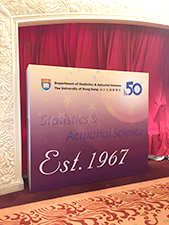|
|
| |
|
|
|
| |
Introduction
|
 Established in 1967, the Department of Statistics and Actuarial Science, the University of Hong Kong plays a cross-faculty role inherent in the interdisciplinary nature of the subjects. Through the interrelated functions of teaching, research and consultancy, the Department serves the disciplines of Statistics and Actuarial Science as one of the three divisions under the School of Computing and Data Science. See our Golden Jubilee Celebration.
Established in 1967, the Department of Statistics and Actuarial Science, the University of Hong Kong plays a cross-faculty role inherent in the interdisciplinary nature of the subjects. Through the interrelated functions of teaching, research and consultancy, the Department serves the disciplines of Statistics and Actuarial Science as one of the three divisions under the School of Computing and Data Science. See our Golden Jubilee Celebration.
In the eyes of the Hong Kong community, the Department is best known for its impressive records of admission to various undergraduate and postgraduate degree programmes. Underpinning this enduring dedication to the state-of-the-art teaching is the Department’s profile of world-class research, for it is well known for being a forerunner in many aspects of research and developments and the comprehensiveness of expertise in a diverse range of subjects.
As an international Centre of Actuarial Excellence with a QS World University Ranking of No.24 for the subject of Statistics and Operational Research (in 2025), the Department works to advance Statistics and Actuarial Science both within academia and in society at large.
|
 Research and Scholarship Research and Scholarship
Some of the international and national recognitions received by our current members: (See our Awards/Honours)
The Department's international standing is shown in its record of high impact publications as well as external and internal awards. The establishment of the Patrick S C Poon Professorship in Statistics and Actuarial Science also helped put the University on the map in the field of Statistics and Actuarial Science. Apart from the above honours, the research awards received by our members in the past also include Silver Guy Medals of the Royal Statistical Society of the UK, Krumbein Award from the International Association for Mathematical Geology, Chinese National Natural Science Awards (Class II), HKU Distinguished Research Achievement Award, HKU Outstanding Researcher Award, HKU Outstanding Research Supervisor Award, HKU Outstanding Young Researcher Award, HKU Research Output Prize, etc.
Members of the Department have amassed publications in top-tier statistics and econometrics journals, including J. American Stat. Assoc., Ann. Stat., J. Royal Stat. Soc. Series B, Biometrika, J. Econometrics, and Automatica. For Actuarial Science, we were ranked No.2 world-wide and No.1 in Asia in a global study conducted by the University of Nebraska-Lincoln, based on research contributions from the top 4 actuarial journals (Insurance: Math. and Econ., N Am Actuar J, ASTIN, Scandinavian Actuar J.) in 2014-2018 amongst non-business schools.
In addition, we have also published various books with reputable overseas publishers, including Chapman and Hall, Springer, John Wiley & Sons, Cambridge University Press, Oxford Science Publications, Imperial College Press, and World Scientific.
|
| |
 Teaching and Learning Teaching and Learning
Undergraduate
The Department of Statistics and Actuarial Science has a long history of offering study programmes in the fields of Actuarial Science, Decision Analytics, Risk Management and Statistics, in addition to the launch of the BASc(AppliedAI)* in 2019. Apart from offering courses to students from other faculties for meeting different degrees’ requirements, the Department currently houses the following accredited degree programmes (with honours):
- Bachelor of Science in Actuarial Science
- Bachelor of Statistics (Decision Analytics)
- Bachelor of Statistics (Risk Management)
- Bachelor of Statistics (Statistics)
In addition to the primary major for the BSc degree, students may take a second major or a minor to broaden their horizon outside their subject of specialization. Second majors and minors are available in both Science and non-Science disciplines. Students must meet certain minimum academic requirements to declare a second major. Some non-Science majors and minors may also require students to have achieved a minimum academic standard before they are allowed to enroll in them.
*Upon the establishment of the School of Computing and Data Science, the BASc(AppliedAI) is currently housed in the Division of Artificial Intelligence and Data Science of the School. The Department of Statistics and Actuarial Science is one of the major teaching departments in the BASc(AppliedAI) programme.
Postgraduate
The Department presently offers one postgraduate programme - Master of Statistics and one joint postgraduate programme – Master of Data Science by coursework. The Department also has an active research postgraduate programme, with over 110 students registered for an M.Phil. or Ph.D.
- Master of Data Science
- Master of Statistics
- Research Postgraduate
|
|
 Knowledge Exchange and Consultancy Knowledge Exchange and Consultancy
In connection with our research and teaching activities, the Department is dedicated to education development through its applied research and knowledge exchange (KE) as services to the community and the profession. The Department also provides, within the constraints imposed by its manpower and teaching commitments, statistical and actuarial advice to anyone seeking it. The University and the Hong Kong environment offer an excellent opportunity for statisticians and actuaries interested in consultative work. Among recent KE activities, typical areas of partnership and consultancy have been financial and risk management problems for financial institutions, forensic investigations, environmental pollution, survey design, clinical trials, medical research and health risks to workers, etc. The non-standard situations encountered are an excellent source of problems for statistical and/or actuarial research.
|
| |
|
|
|
|
|
|